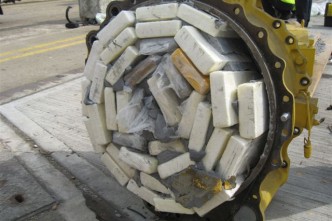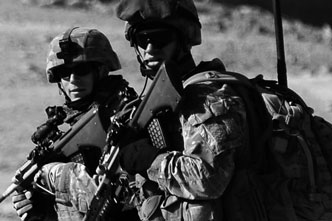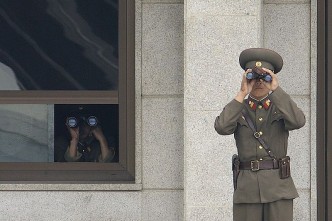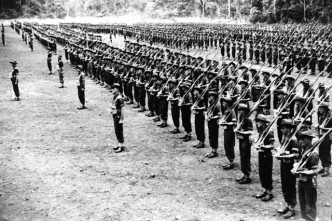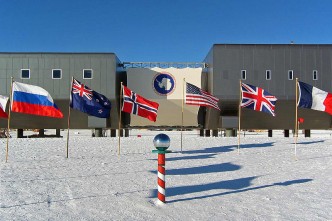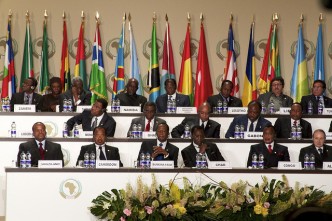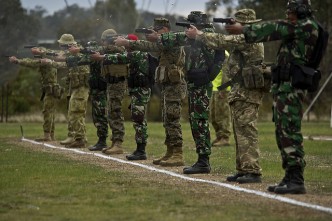With his appointment as the Secretary of the Defence Department last year, Dennis Richardson has joined Arthur Tange as the only public servant to have headed both the departments of Foreign Affairs and Defence. Given …
China released a new Defence White Paper. Lots of commentary on that, including from the BBC, NYT, and The Australian. In particular it seems that China didn’t include a no-first-use statement about its nuclear arsenal. …
Mark’s explanation of what is complex terrain is pithy. Asia has two free trade agreements, one championed by the US at the expense of China (TPP), and one via ASEAN which includes China but not …
This week I was part of a group launching the United Nations Office on Drugs and Crime (UNODC) threat assessment on Transnational Organized Crime in East Asia and the Pacific. Alongside writers of the report …
Surely the discussion (see yesterday’s posts from Andrew Davies and Graeme Dobell) about average percentage of GDP allocated to defence investment is a straw man floated by the Minister for Defence. Somewhat successfully it seems. Defence …
Guest editor Anthony Bergin The science that Australia undertakes in Antarctica should be, and be seen to be, in Australia’s national interests. There are many reasons for Australia to be actively engaged in Antarctic science, …
In simple terms, defence budgets comprise funding for new equipment, for people or for operating costs, and can alternate between them. Since the early 1990s, a series of reform initiatives have been undertaken based on …
As a budget, a White Paper and an election crowd the calendar, Defence counts down the days to the withdrawal from Afghanistan. It’s easier for the Defence Minister to talk about Afghanistan than to say …
As Graeme Dobell’s account of Defence Minister Stephen Smith’s speech suggests, there was scepticism in the audience about his claim that the defence budget over the past twelve years averaged out at a little over …
Recent posts by Tanya Ogilvie-White, Ron Huisken, and Rod Lyon provide stimulating perspectives on North Korea’s evolving strategy and international responses to it. The lion’s share of recent commentary on North Korea has tended to …
I spent September 1984 sleeping in German forests and barnyards. It was Exercise Lionheart and my regiment, the Royal Yeomanry, was providing rear area security for the British Army of the Rhine. Perhaps unsurprisingly, the …
In Peter Layton’s recent post Australia’s many ‘maritime strategies’ he noted that: [A] maritime strategy of land force expeditionary warfare across the Indonesian archipelago… sounds somewhat reminiscent of the last days of WWII, when Australia …
Guest editor Anthony Bergin The Antarctic Treaty is a successful and effective international instrument, providing a stable framework for over half a century of collaborative governance. It provides a means for geopolitical interests to be …
In the world of strategic affairs, competition is almost always a bad thing. Be it jostling over territory, contesting freedom of navigation or an outright arms race, strategic competition tends to be both costly and …
Today, ASPI released my report ‘Planning the unthinkable war: ‘AirSea Battle’ and its implications for Australia’ [view our interview with Ben Schreer on his paper here]. When China’s military modernisation hit its stride over the last …
While Julia Gillard was preparing for her high-profile visit to China, less noticed by the Australian media was a visit to the United States from 1 to 4 April by Singaporean Prime Minister Lee Hsien …
First up Captain Henry J. Hendrix argues in this paper from CNAS that aircraft carriers may be too vulnerable to play the central role in future conflicts that they have played in the past. We …
African security issues are likely to account for a large proportion of Australia’s work on the Security Council and beyond Australia’s two year term, it must be recognized that a more secure Africa is in …
Margaret Thatcher sent me to cover a war, she showed me how leaders do diplomatic knife fights at the summit and she gave me a front row seat as she bruised and bent Britain in …
This year will mark 25 years since then Australian Foreign Minister Gareth Evans delivered a landmark address (PDF) to an Australia–Indonesia business group in Bali, in which he first raised the importance of ‘building ballast’ into …





